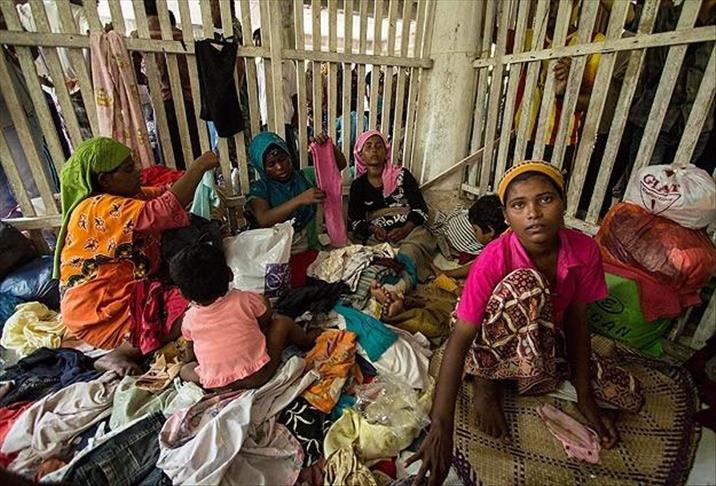
By Max Constant
BANGKOK
The International Organization for Migration (IOM) has expressed fears for the many thousands of Rohingya and Bangladeshi it says remain at sea at the hands of people smugglers.
Since Sunday, around 2000 of the famished migrants have been dumped from rickety boats on the shores of Indonesia and Malaysia.
“Our biggest concern is the 8,000 migrants who are unable to land on shore," Jeff Labovitz, the IOM chief of mission for Thailand, told Anadolu Agency on Tuesday.
“We know the longer they are at sea, the more their health will degrade. They suffer from vitamin deficiency and will soon look like skeletons. Beriberi is a major concern,” he said.
Malaysian Chief Sup't Harrith Kam Abdullah told AA on Monday that around 1,018 people were dropped from boats off its northwestern coast overnight - the third such shipments to the region in two days after 500 and then 900 migrants were dumped on Indonesia's north-western coast of Aceh.
"We are expecting more," said Abdullah. "We are investigating the detainees to find more information on the syndicate and agent details."
The beachings follow the May 1 discovery of the bodies of 33 Rohingya and Bangladeshi migrants at an abandoned people smuggling camp in Southern Thailand -- over Malaysia’s northern border.
Thai authorities have since transferred 53 policemen based in the southern provinces of Songkhla, Ranong and Satun -- where smuggling of Rohingya is widespread -- to inactive posts.
Chris Lewa, the director of the Arakan Project, has told AA that the increased pressure from the Thai authorities on the gangs has forced smuggling camps offshore, with many Rohingya and Bangladeshi now held off the Thai coast.
Labovitz on Tuesday described the task of locating and helping the boats, scattered in the vast Indian Ocean and the Andaman Sea, as "an almost impossible task."
“We need to find where these boats are, but it is like looking for a needle in a haystack,” he stated. “We welcome any government who is able to off-load these migrants and bring them some humanitarian help.”
He underlined that support from the Turkish Foreign ministry and from ECHO, the humanitarian arm of the European Union, has been crucial to facilitate IOM operations.
Many of the migrants are Rohingya Muslims - which the United Nations considers the world's most persecuted ethnic minority - fleeing Myanmar's Rakhine state.
They travel through Myanmar's western border, down through Bangladesh to Cox’s Bazar, and then get on boats in an effort to reach the economic promise of Malaysia.
They are often accompanied on the journey by other Rohingya from the refugee camps of southern Bangladesh, and also locals seeking to reach Malaysia.
While most make the journey voluntarily, some are kidnapped and forced onto the boats, and ransoms sent to their families while they are held at camps on Thailand and Malaysia's border.
Labovitz estimated that around 29,000 people had made the journey by boat from Bangladesh since the beginning of the year - “a big increase compared to last,” he added.
Andrew Day, an activist working with Rohingya refugees in Bangladesh confirmed to AA that large numbers of Rohingya had left Cox’s Bazar.
“It is a steady business. [The Smugglers] count heads and collect money. When they get to the number they are looking for [usually 500], they call them [the boats] up to leave,” he said.
“The Rohingya themselves are walking the camp and recruiting,” he added.
Labovitz confirmed that “almost 600 migrants had landed in Indonesia, and over 1,000 in Malaysia in the last few days.”
He said he had also heard that a boat carrying 400 migrants had been towed Tuesday from Indonesian waters.
The gruesome May 1 discovery of the corpses in Thailand has shocked the Kingdom, which is under heavy pressure from the U.S. and European Union for its paltry record on human trafficking.
Last year, it was given the lowest possible ranking in a U.S. State Department's human trafficking report, while earlier this month the EU gave Thailand six months to improve efforts in combating illegal fishing by trawlers on which migrants are used in “slave-like conditions.”
On Tuesday, Labovitz expressed his gratitude to Thai authorities for crackdown on the smugglers, describing them as "brutal businessmen.”
“They keep people in camps, beat and torture them. If their relatives don’t pay the ransom money, smugglers are happy to let them die."
* Anadolu Agency Correspondent Kaamil Ahmed contributed to this story from Bangladesh
Anadolu Agency website contains only a portion of the news stories offered to subscribers in the AA News Broadcasting System (HAS), and in summarized form. Please contact us for subscription options.

